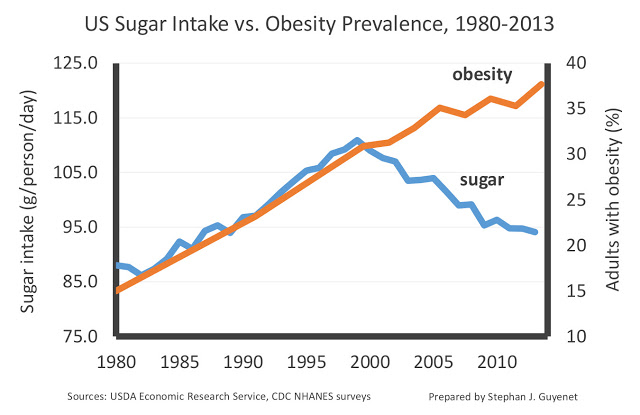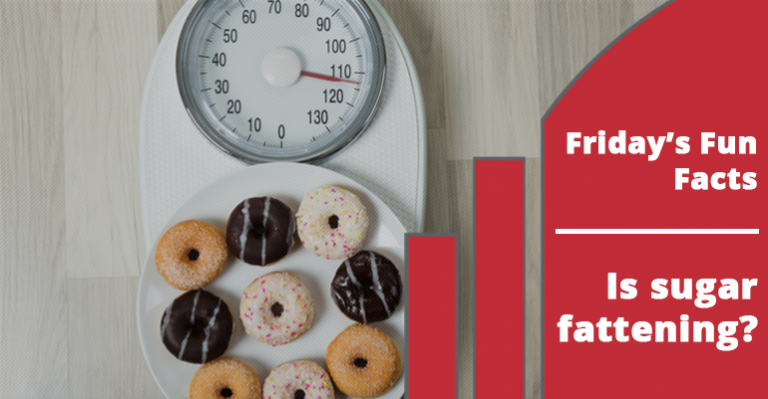I was in the gym the other day when I overhead a client complaining to her personal trainer that the reason she was unable to lose any weight is because she’s addicted to sugar. She continued to justify her addiction by saying how there’s one study showing sugar to be more addictive than cocaine!
Well, as you can imagine I wanted to share my two cents but decided to stay well out of the conversation. However, it has led me to answer the question about whether eating sugar really does make us gain more weight.
First, let me address the sugar/cocaine study. Yes, there is a study from back in 2007 that concluded sugar was more addictive than cocaine. The basic outline was that rats were given cocaine until they became dependent on it. Then, researchers provided them a choice where they could continue to have the cocaine or they could switch to sugar. Surprise, surprise, they (94%) chose to make the switch over to sugar – from this result the researchers concluded:
“that intense sweetness can surpass cocaine reward, even in drug-sensitized and -addicted individuals.”
And now everyone who’s campaigning against sugar seems to reference this study to back their argument up.
However, let’s just stop to think about this for a second… the rats were fed cocaine until they became dependent on it, which means this was their main source of ‘food.’ The researchers then introduced them to sugar to give them a choice between cocaine and sugar… of course they’re going to choose the sugar over cocaine, they’re rats and their first instinct is to survive!
Gosh, I bet if you gave them a choice between cocaine and blueberries, or cocaine and tuna, they would all turn to the blueberries and tuna, because it’s food! This doesn’t suddenly mean blueberries or tuna are more addictive than cocaine… our survival mechanisms will always make us choose the one that will keep us alive.
So really, this is a hugely flawed and unfair set of results and should be ignored when making an argument against sugar.
Other commonly cited studies among the ‘sugar haters’ are ones from 2004 and 2007, that show correlations between the populations’ rise in obesity and our consumption of sugar from the 1960s to early noughties.
If you were to just look at the data up until 2000, you could be fooled into thinking sugar intake was the cause for our rise in obesity. However, if you then look beyond 2000 and into more recent years, you’ll find this association disappears. In fact, from the early noughties right the way through to 2013, our intake of sugar falls while obesity rates continue to climb. [1]

Sugar isn’t inheritably fattening, but like any food can cause weight gain if you’re overfeeding (Te Morenga 2012). If you’re under eating and in a caloric deficit then it doesn’t matter whether you’re on a low fat, high sugar diet, a low fat, high carb diet, or even a high sugar diet where almost 50% of your calories are coming from sugar – there is no difference in weight loss or fat loss between either diets. (West & De Looy 2001) (Saris, et al. 2000) (Surwitt, et al 1997).
So, if our intake of sugar is declining why is obesity still on the rise? Well the fact of the matter is we’re eating more but moving less. Data shows we’re now eating around 500 calories more than we were in the 1960s, and that the energy we expend through moving around is 142 calories lower from what it once was (Church TS, et al. 2011).
Hence why we’re now recommended to reach 10,000 steps per day, enough to burn around 500 calories, the additional calories we’re now consuming.
The only problem I can see with sugar is how palatable it is – it tastes great and we all love it, hence why it’s used in a lot of foods. Sugar on its own isn’t ‘evil’, but a lot of foods that contain high amounts of sugar also contain high amounts of fat, as the two together make our taste buds dance like crazy! The problem is, these foods don’t seem to fill us up in the same way foods high in protein and fibre do, so we’re always left craving more…
Bonus note: as you’ve just learnt when it comes to adding sugar into your diet you have nothing to fear. However, things do become a little more complicated when looking at how sugar and glucose metabolism works in obese individuals - something I will cover in a future post.
References:
1. wholehealthsource.blogspot.co.uk/2015/11/carbohydrate-sugar-and-obesity-in.html


